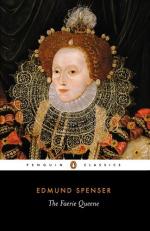CANTO XII
I. The Plot: The death of the dragon is announced by the watchman on the tower of the city, and Una’s parents, the King and Queen, accompanied by a great throng, come forth rejoicing at their deliverance. The Knight and Una are conducted with great honors into the palace. On the eve of their betrothal, Archimago suddenly appears as Duessa’s messenger and claims the Knight. Their wicked attempt is frustrated, and the pair are happily betrothed. After a long time spent in Una’s society, the Knight sets out to engage in the further service of the Faerie Queene.
II. The Allegory: Holiness, by conquering the devil, frees the whole human race from the tyranny of sin. It is embarrassed by the unexpected appearance of the consequences of its past sins, but makes a manly confession. In spite of hypocritical intrigues (Archimago) and false slanders (Duessa), Holiness is united to Truth, thus forming a perfect character. The champion of the church militant responds cheerfully to the calls of duty and honor.
2. Reformed England, having destroyed the brutal power of Rome, is firmly united to the truth in spite of the intrigues of the Pope to win it back to allegiance. It then goes forth against the King of Spain in obedience to the command of Queen Elizabeth.
3. VERE THE MAINE SHETE, shift the mainsail, BEARE UP WITH THE LAND, direct the ship toward land.
25. OUT OF HOND, at once.
43. OF TALL YOUNG MEN. An allusion to Queen Elizabeth’s Pensioners, a band of the tallest and handsomest young men, of the best families and fortunes, that could be found (Warton). ALL HABLE ARMES TO SOWND, all proper to wield armes.
57. TO THE MAYDENS, to the accompaniment of the maidens’ timbrels.
71. IN HER SELF-RESEMBLANCE WELL BESEENE, looking well in her resemblance to her proper self, i.e. a king’s daughter.
73. THE RASKALL MANY, the crowd of common people.
116. OF GREAT NAME, of great celebrity, i.e. value.
117. FITTING PURPOSE FRAME, held fitting conversation.
xiv. Kitchin and Percival think this whole passage a clever compliment to the parsimony of the Queen’s court.
161. THAT PROUD PAYNIM KING, probably a reference to Philip of Spain.
168. NOR DOEN UNDO, nor undo what has been done.
173. IN SORT AS, even as.
205. ALL WERE SHE, although she had been. IN PLACE, in various places.
313. BAIT. In Spenser’s time bear-baiting was a favorite pastime of the people and received royal patronage.
328. THE HOUSLING FIRE, the sacramental fire. Spenser seems here to have in mind, not the Christian housel or Eucharist, but the Roman marriage rites with their symbolic fire and water.
347. TRINALL TRIPLICITIES, the threefold three orders of the celestial hierarchy according to the scholastic theologians. They were as follows: (1) Seraphim, Cherubim, Thrones; (2) Dominations, Virtues, Powers; (3) Princedoms, Archangels, and Angels. Cf. Dante’s Paradiso, xxviii, Tasso’s Jerusalem Delivered, xviii, 96, and Milton’s Paradise Lost, v, 748.




